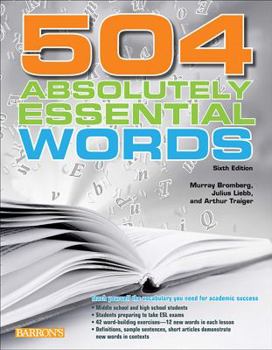504 Absolutely Essential Words
Select Format
Select Condition 
Book Overview
This updated vocabulary-building book presents the essential core of words that students at middle-school and higher levels must know and be able to use fluently for academic success. These words also constitute essential vocabulary for ESL students and test-takers, as well as others who speak English as their second language. The authors present a series of brief word-building lessons, each introducing 12 new words that are presented in sample...
Format:Paperback
Language:English
ISBN:0764147811
ISBN13:9780764147814
Release Date:May 2012
Publisher:Barrons Educational Services
Length:208 Pages
Weight:1.05 lbs.
Dimensions:0.5" x 7.8" x 10.8"
Age Range:11 to 17 years
Grade Range:Grades 6 to 12
Customer Reviews
5 ratings
A terrific guide to building your vocabulary for ESL students
Published by Thriftbooks.com User , 15 years ago
As an ESL teacher, my students are always telling me how they need to build their vocabulary. Sure, someone can do this by reading more. But, non-native English speakers are often confused by many common English words. This book has 504 vocabulary words that native speakers use often, but which can be confusing to non-native English speakers. With clear but simple definitions, examples and exercises, people who read this book can easily build their useful English vocabulary.
This is the one!
Published by Thriftbooks.com User , 16 years ago
This is the book i highly recommend for middle school students to increase their vocabulary. It has words that are higher level, but not outrageously so. It just concentrates on vocabulary words, not words a student needs for multiple subjects...just high-use words. The activities are good reinforcement and practice. Try this book first and don't waste your money on others for this this age group.
Very helpful book
Published by Thriftbooks.com User , 16 years ago
I homeschool my son and this book has been very helpfull, would recomend it to anyone who needs assistance with spelling.
Easy to learn, easy to retain, easy to enjoy :)
Published by Thriftbooks.com User , 24 years ago
You are an ESL student or a non-native speaker of English?You want to improve your American English vocabulary?You also want to avoid the verbose academic methods?Stop here! You get it!I've just finished "504..." today and frankly, I'm fully satisfied. Murray, Julius and Arthur have set up a very intuitive and captivating course: a set of 42 lessons cut up in 7 sessions, each session separated by a review.How does a typical lesson work?You have a list of 12 words in a yellow vignette, so you can see what you're gonna learn in a quick glance. The details appear on the right: for each of the words, you have: their standard pronunciation(s) (essential!), their definition(s) and 3 examples of common use. After that, a short article using all of them is presented. The coolest thing is you often meet in the example sentences and articles the words you learnt before. It's a good way to practice them again and test your learning. And you know what? Some articles can even teach you many things beyond English!Then come 3 exercises. Two are repeated over the lessons: you have 12 sentences with blanks and you fill them in with one of the words. The second standard exercise is an illustration and you are encouraged to find which of the words is hidden behind. The 3rd exercise varies, depending on the lesson. You can expect one of these: * Make up your own 12 sentences,* Find synonyms or antonyms,* Find the words from their definition,* Find among 12 phrases those which don't make sense.Each lesson should not take you more than an hour, maybe even less. Besides, it happened from time to time that 1/2 hour was sufficient for me."Okay", I heard you say, "but I'm still not convinced. How did you do in practice?"Well, generally, I tried to follow 5 lessons a week, i.e one after my workday. I looked at the new words I had to learn and checked the pronunciation. I repeated each word 10 times aloud, even if I didn't know what it meant. Afterwards, I repeated all the list up and down as many times as needed (between 3 and 5 times) for my pronunciation to be a reflex. I didn't want to take bad habits of pronunciation by reading the definition first and realize half a minute later that my mouth and my tongue hadn't done their job correctly, you see. A word is like a girl's name. She likes to hear her name pronounced correctly. When a boy meet a damsel for the first time and plans to keep in touch with her, he longs to know her name and he'll carefully use it the next time. I think it's the same for a word. Try to be nice to it and name it correctly before living with it. You should do this for *all* the words: if pologamy is illegal, polywordy isn't ;)So, as soon as I was at ease with the pronunciation, I read the examples *before* the definition. Why? Because I wanted to guess the meaning: I had noticed that a word is all the better memorized as you feel you already know it somehow. Finally, to check my guess, I read the definitio
Good class-room book!
Published by Thriftbooks.com User , 25 years ago
I use this book to teach school children and working adults and I find it a good book to use. There are 12 words to be learnt in each lesson with many examples to show how these words are used in sentences and stories. There are also exercises for the learners to practise using these words either in constructing sentences, filling in the blank, matching, etc....




